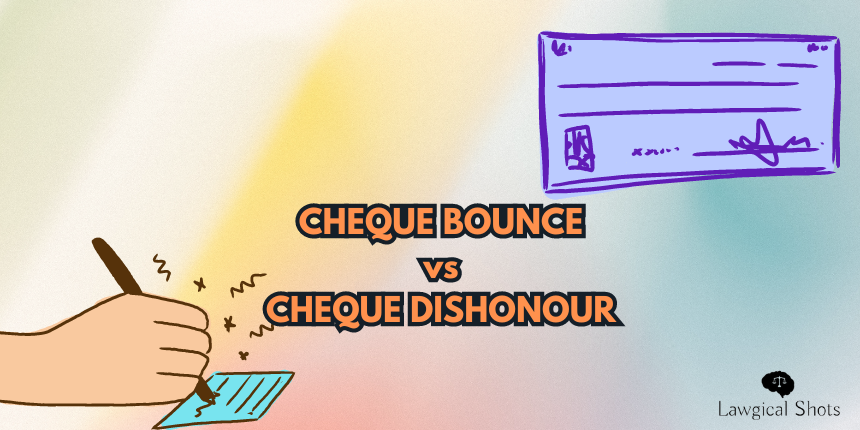You are in your dream, just signing a cheque against a business deal, everything is going so fast. Later, you recall all the details that you mentioned in the cheque…..OH NO!!…..you mentioned the previous year instead of the current one…..What will happen now? CHEQUE BOUNCE?? Will you face cheque bounce case??? Will you have to go to jail for this mistake???? And then you wake up from your nightmare with sweat on your forehead. Pheww…..it was just a dream!! But wait, was it worth all the fear? Would you be jailed if you made that mistake? People often use cheque bounce and dishonour of cheque in a synonymous manner. However, there is a world of difference when it comes to Section 138 of NI Act.
Cheque Bounce vs Cheque Dishonour
Here in this blog, we have thrown some light upon the difference between cheque bounce and cheque dishonour. Have a look and let us know at our LinkedIn page if we missed out on anything crucial.
What is Cheque Bounce?
A return of cheque by the payee bank due to any reason may result in cheque bounce. Not every instance will result in cheque bounce case. There are specific requirements which need to be complied with while presenting a cheque. In case of some mistake or gap, the bank may refuse to process the cheque and return the same, leading to bouncing back of such cheque. Given below is a list of reasons for why a cheque may be returned by the bank.
Cheque Bounce Reasons List
- Cheque was damaged
- Date on Cheque was invalid
- Insufficient funds in drawer’s account
- Incorrect information on the cheque
- Overwriting on cheque
- Difference in amount mentioned in numbers and words
- Amount beyond transaction limit
- Drawer applied for ‘Stop-Payments’
- Account Frozen or Closed
- Drawer’s signature missing
- Drawer’s signature mismatched
- Suspicion of forged cheque
Understanding Cheque Dishonour
Section 138 of Negotiable Instruments Act, 1881 lays the cheque bounce case procedure to be followed in case of insufficient funds, etc. There are specific requirements under the provision as replicated here:
“138. Dishonour of cheque for insufficiency, etc., of funds in the account.—Where any cheque drawn by a person on an account maintained by him with a banker for payment of any amount of money to another person from out of that account for the discharge, in whole or in part, of any debt or other liability, is returned by the bank unpaid, either because of the amount of money standing to the credit of that account is insufficient to honour the cheque or that it exceeds the amount arranged to be paid from that account by an agreement made with that bank, such person shall be deemed to have committed an offence and shall, without prejudice to any other provision of this Act, be punished with imprisonment for 4 [a term which may be extended to two years’], or with fine which may extend to twice the amount of the cheque, or with both: Provided that nothing contained in this section shall apply unless—
(a) the cheque has been presented to the bank within a period of six months from the date on which it is drawn or within the period of its validity, whichever is earlier;
(b) the payee or the holder in due course of the cheque, as the case may be, makes a demand for the payment of the said amount of money by giving a notice; in writing, to the drawer of the cheque, 5 [within thirty days] of the receipt of information by him from the bank regarding the return of the cheque as unpaid; and
(c) the drawer of such cheque fails to make the payment of the said amount of money to the payee or, as the case may be, to the holder in due course of the cheque, within fifteen days of the receipt of the said notice.
Explanation.—For the purposes of this section, “debt of other liability” means a legally enforceable debt or other liability.”
Hence, it can be understood that the key ingredients for a dishonour of cheque is a legal debt which was initially supposed to be paid through a cheque, which was returned due to insufficiency of funds.
Also read – Cheque Bounce Notice Limitation and Important Pointers on Cheque Bounce Notice Format under Negotiable Instruments Act
Difference between Cheque Bounce and Cheque Dishonour
Whenever we hear cheque bounce, people usually connect it with Section 138 of NI Act, assuming that now the person will have to face penal consequences. That is why the differentiation of cheque bounce vs. cheque dishonour is important. While cheque bounce may be caused due to ‘n’ number of reasons ranging from mismatched signatures to frozen accounts, it does not constitute an offence under the Negotiable Instruments Act. Legal proceedings under Section 138 of NI Act may be initiated only in case such a cheque was returned due to insufficient funds in the drawer’s account, and the same was drawn as against some debt/ legal obligation.
Inference
Here, we can conclude that although the two terms are used synonymously, cheque bounce is a wider term and cheque dishonour could be categorised as one of the many outcomes. Like we say that all squares are rectangles but all rectangles are not squares, it could be said that all cheque dishonours are cheque bounce, but not all cheque bounce are dishonour of cheque. It is more of a genus and species connection, cheque dishonour being the species and cheque bounce being the genus, the wider category. Here, we hope that mathematics and science helped in understanding the concept of cheque bounce vs cheque dishonour.








